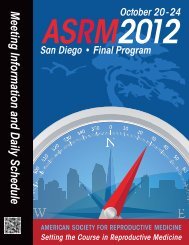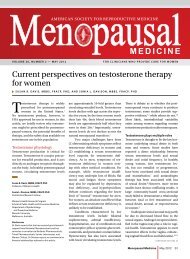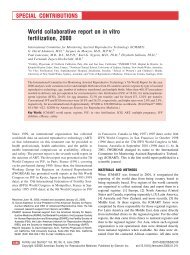scientific program • symposia - American Society for Reproductive ...
scientific program • symposia - American Society for Reproductive ...
scientific program • symposia - American Society for Reproductive ...
You also want an ePaper? Increase the reach of your titles
YUMPU automatically turns print PDFs into web optimized ePapers that Google loves.
44 TH ANNUAL POSTGRADUATE PROGRAM<br />
Developed in Cooperation with the <strong>Society</strong> <strong>for</strong> <strong>Reproductive</strong> Endocrinology and Infertility, the PCOS <strong>Society</strong>, and the Androgen Excess Special Interest Group<br />
FACULTY<br />
Enrico Carmina, M.D., Chair<br />
Daniel A. Dumesic, M.D.<br />
Terhi Piltonen, M.D., Ph.D.<br />
Elisabet Stener-Victorin, Ph.D.<br />
ACGME COMPETENCY<br />
Patient Care<br />
NEEDS ASSESSMENT AND COURSE DESCRIPTION<br />
Polycystic ovary syndrome (PCOS) is one of the most common endocrinologic conditions, affecting 6-8% of women. There is<br />
a lack of understanding about the early onset of the condition, as well as confusion over the best management strategies,<br />
the genetic nature of the disease and the possible familial impact of PCOS. This results in lack of appropriate advice in the<br />
office setting to all possible affected members of the family.<br />
This course, aimed at clinicians and laboratory scientists alike, will provide the latest in<strong>for</strong>mation on what is known about<br />
the development of PCOS and the different concerns across the lifespan, from preadolescence to postmenopause.<br />
Evidence-based treatment protocols regarding physical exercise, acupuncture, oral contraceptive and statin therapy will<br />
be reviewed to provide up-to-date recommendations <strong>for</strong> patient care.<br />
LEARNING OBJECTIVES<br />
At the conclusion of this course, participants should be able to:<br />
1. Describe the important features of the diagnosis of PCOS and its presentation and impact of phenotypes on<br />
cardiovascular disease risk.<br />
2. Summarize the impact of environment, nutrition and obesity on the development and severity of PCOS.<br />
3. Define effective treatment strategies <strong>for</strong> non-fertility care.<br />
________________________________________________________________________________________________________________________<br />
Developed in Cooperation with the European <strong>Society</strong> <strong>for</strong> Human Reproduction and Embryology<br />
FACULTY<br />
Mary Stephenson, M.D., Chair<br />
Ole B. Christiansen, M.D., Ph.D., Chair<br />
Kurt T. Barnhart, M.D., M.S.C.E.<br />
Roy G. Farquharson, M.D.<br />
Mariette Goddijn, M.D., Ph.D.<br />
William H. Kutteh, M.D., Ph.D., H.C.L.D.<br />
ACGME COMPETENCY<br />
Patient Care<br />
PCOS: METABOLIC IMPACT AND LONG-TERM MANAGEMENT<br />
Course PG6 (Saturday) <strong>•</strong> ROOM 224 G/H CME<br />
EARLY PREGNANCY WORKSHOP<br />
Course PG7 (Saturday) <strong>•</strong> ROOM 224 E/F CME<br />
NEEDS ASSESSMENT AND COURSE DESCRIPTION<br />
There are many unclear and controversial issues surrounding early pregnancy. First, the location and management of<br />
symptomatic early pregnancy remains a challenge to the clinician. Second, new guidelines recommend new, less negative<br />
terminology, <strong>for</strong> example, replacing “abortion” with “miscarriage”, both in clinical practice and in textbooks and <strong>scientific</strong><br />
journals, but such changes are not universally used and further discussion ensues. Third, chromosome testing of couples<br />
with a history of recurrent miscarriage has been universally accepted as standard of care but recent studies raise doubts<br />
about its cost effectiveness. Fourth, management of idiopathic recurrent miscarriage remains controversial, although recent<br />
randomized controlled trials suggest that empiric use of aspirin and/or heparin does not improve pregnancy outcome.<br />
This presentation, designed <strong>for</strong> primary care physicians, physicians specializing in fertility, genetics, obstetrics and<br />
gynecology and internal medice, nurses and genetic counselors, will review the most up-to-date guidelines and<br />
perspectives from experts in the field from both North America and Europe. Discussions regarding the management of early<br />
pregnancy will be based on the highest level of evidence in the literature. Topics to be addressed include early pregnancy<br />
terminology, debates over treatment of thrombophilias in pregnancy and chromosome testing of miscarriages, and future<br />
directions in the field.<br />
45








